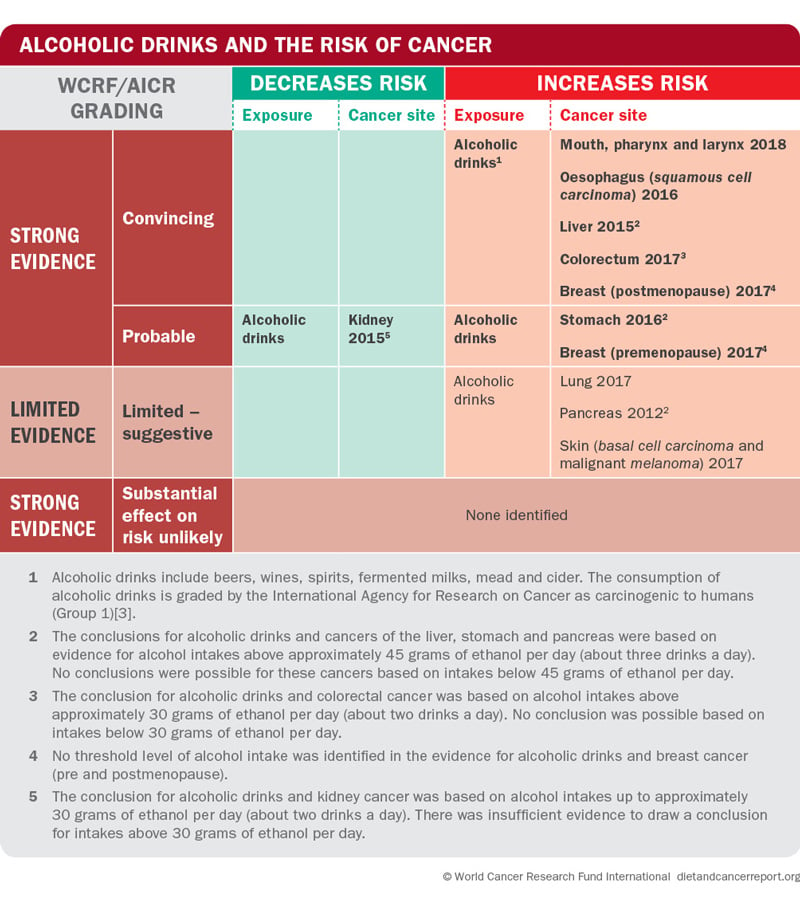Dieting Too Hard and Drinking Give Me Cancer
Consumption of alcohol
Harmful alcohol consumption has been linked to more than 200 diseases and injury conditions, including cirrhosis, infectious diseases, cardiovascular disease, early dementia and cancer.
Worldwide consumption of alcoholic drinks in 2016 was equal to 6.4 litres of pure alcohol (ethanol) per person aged 15 years or older, which is equivalent to about one alcoholic drink per day. However, consumption varies widely.
In many countries, alcohol consumption is a public health problem. Alcohol consumption is expected to continue to rise in half of the World Health Organization (WHO) regions unless effective policyreverses the trend.
OUR MAJOR FINDINGS ON CANCER AND ALCOHOL
There is strong evidence that consuming:
alcoholic drinks INCREASES the risk of
- mouth, pharynx and larynx cancers
- oesophageal cancer (squamous cell carcinoma)
- breast cancer (pre and postmenopause)
two or more alcoholic drinks a day (30 grams or more) INCREASES the risk of
- colorectal cancer
three or more alcoholic drinks a day (45 grams or more) INCREASES the risk of
- stomach cancer
- liver cancer
up to two alcoholic drinks a day (up to 30 grams) DECREASES the risk of
- kidney cancer

> See more graphics in our toolkit
The evidence shows that, in general, the more alcoholic drinks people consume, the higher the risk of many cancers.
– This is the opinion of the Expert Panel and forms the basis of our Recommendation on alcoholic drinks
The exception is kidney cancer, where the risk is lower for up to two alcoholic drinks a day; however, for more than two drinks a day the level of risk is unclear. For some cancers, there is an increased risk with any amount of alcohol consumed, whereas for other cancers the risk becomes apparent from a higher level of consumption, of about two or three drinks a day (30 or 45 grams of alcohol per day).
Cancer Prevention Recommendation
For cancer prevention it's best not to drink alcohol.
There is also other evidence on alcoholic drinks that is limited (either in amount or by methodological flaws), but is suggestive of an increased risk of lung, pancreatic and skin cancers. Further research is required, and the Panel has not used this evidence to make recommendations.
Does the type of alcoholic drink matter?
The Panel judges that alcoholic drinks are a cause of various cancers, irrespective of the type of alcoholic drink consumed. This is because all alcohol contains ethanol and ethanol is the cancer causing compound. The extent to which alcoholic drinks are a cause of various cancers depends on the amount and frequency of alcohol consumed.
Mechanisms
Alcohol and cancer
The precise mechanisms underlying the relationship between alcohol consumption and certain cancers is not completely understood. A large body of experimental evidence has shown that acetaldehyde, the principal and most toxic metabolite of alcohol, disrupts DNA synthesis and repair and thus may contribute to a carcinogenic cascade. Higher ethanol consumption also induces oxidative stress through increased production of reactive oxygen species, which are potentially genotoxic. It is hypothesised that alcohol may also function as a solvent for cellular penetration of dietary or environmental (for example tobacco) carcinogens or interfere with DNA repair mechanisms. High consumers of alcohol may also have diets that are lacking in essential nutrients, such as folate, rendering target tissues more susceptible to carcinogenic effects of alcohol.
Alcohol and kidney cancer
The mechanisms that may explain the inverse relationship between moderate alcohol consumption and kidney cancer risk are uncertain but appear to be consistent for the various renal cancer subtypes. Possible biological mechanisms proposed include improved blood lipid profiles among people who drink a moderate amount of alcohol and higher adiponectin levels. It has been suggested that the diuretic effects of alcohol may, in part, be responsible for lower kidney cancer risk among people who drink alcohol. However, inconsistent results for the consumption of other fluids and of diuretics and kidney cancer risk do not support this hypothesis.
> Read more about the cancer process
Dieting Too Hard and Drinking Give Me Cancer
Source: https://www.wcrf.org/dietandcancer/alcoholic-drinks/